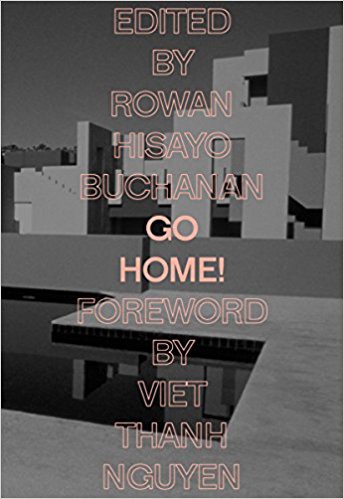Interviews
A New Anthology of Asian American Writing Asks What Home Even Means
‘Go Home!’, edited by Rowan Hisayo Buchanan, attempts to answer the question “Where are you from?”

It’s 2018, and, just a few weeks ago, Olympian Mirai Nagasu landed her history-making triple axel. During the joyful outpouring that followed, New York Times writer and editor Bari Weiss sent out a would-be supportive tweet: “Immigrants: They get the job done.” The thing is, though, Nagasu isn’t an immigrant; she was born in Montebello, in California. Told of her mistake, Weiss tweeted that she’d believed she was taking poetic license. It was “another sign of civilization’s end,” she said, that people reacted so strongly, and negatively, to her mistake.

But it’s not any kind of mistake: that tweet reflected a much larger issue. To live in an Asian-looking body in a Western country so often involves being perceived as foreign, alien, from and of elsewhere. Go home, racist people tell us, while this is our home; go back to your country, while this is where we belong. Go Home! is also the title of a new anthology of Asian diasporic writing, edited by Rowan Hisayo Buchanan, and issued by the Asian American Writers’ Workshop and the Feminist Press. The book includes prose and poetry from writers as varied — and as wonderful — as Viet Thanh Nguyen, Alexander Chee, Kimiko Hahn, Alice Sola Kim, Mohja Kahf, Wendy Xu, Sharlene Teo, Wo Chan, Muna Gurung, Muhammad Amirul bin Muhamad, Jennifer Tseng, Rajiv Mohabir, Gina Apostol, Fariha Róisín, Esmé Weijun Wang, Chaya Babu, Mia Alvar, Amitava Kumar, Karissa Chen, Gaiutra Bahadur, Jason Koo, T. Kira Madden, Marilyn Chin, and Chang-rae Lee.
I talked to Buchanan about totemic writers, how the anthology opens up the complexities of Home, and the gross simplicity of racism.

R.O. Kwon: What inspired the idea of assembling this anthology? Was there any one catalyzing event, or was it more an ongoing sense of need?
Rowan Hisayo Buchanan: The coming together of the Feminist Press and the Asian American Writers’ Workshop was the practical catalyst. But my need for a book about home long predates that.
I have a Japanese-Chinese-American mother and a British father and I’ve spent a lot of time thinking about home and where it might be. I’ve had a lifetime of people asking “What are you?” And sometimes I felt like I didn’t have the answer. I’d end up in conversations about the virtues of “Oriental women” that made me want to scream for myself, for my mother, and my grandmother. But I’d smile just like they imagine good Oriental women do, and try to escape.
My grandmother was born in Shanghai but has spent 67 years in America. She learned to program early computers. She learned to drive a car for a job in Texas. I’ve caught her having telephone chats with telemarketers about the Green Bay Packers. But she also leaves food on the ancestral altar. She’ll tell me I can live with her as long as I like because that’s the Chinese way. But none of that complexity fits into their idea of an Oriental Woman. Racism simplifies.
I suppose I wanted to find a better way to answer when asked, “Where are you from?”
So perhaps it’s no coincidence that complicated and fraught homes figure heavily in my own work. In my novel, Harmless Like You, a Japanese artist abandons her family and runs away to Berlin. I was curious and excited to find out what other Asian diasporic writers made of Home as a topic. I suppose I wanted to find a better way to answer when asked, “Where are you from?”
Kwon: Wait, conversations about the virtues of “Oriental women” — conversations, plural, what the hell?
Buchanan: Usually the conversations are with older men who I am trapped next to for one reason or another. For example, an older man, who was a donor to an institution I cared about a lot. He has now passed on and his legacy does good work, so I will allow him to remain nameless. But for an hour or so over drinks he congratulated me on the fact that, for an Oriental woman, I made good eye contact.
Another time, I ended up talking to a European man who had once been married to a Japanese woman who was “very cold.” But he planned to go to rural China to find a new girlfriend, where they were “still grateful.”
I don’t know if it’s because I’m mixed race that they feel able to tell me these things? Or is my face too sympathetic? They usually come up with so many clichés that I feel almost ashamed to be reporting them. It seems like racism should be more complex, but sometimes it’s not.
How Writing Filled the Void Left by Losing God
Kwon: I’m really sorry that happened. As for racism not being complex — I agree, evil can be so simple. How did you think about what kinds of writing, and from whom, you wanted to include in the book?
Buchanan: While I am aware that no single book can capture the complexity of Home, I wanted to try to allow the book to speak to many different experiences of what home might be. Some of the pieces have been published elsewhere and some are brand new. I envisioned this book as a conversation. It is a mix of fiction, non-fiction and poetry. Truth and beauty come in many costumes. It was exciting to put a story about demon-summoning Korean adoptees in the same book as a personal essay about border control and a poem about a makeup counter.
We tried to reach out to a range of writers from different ages and backgrounds. One of the joys of an anthology is the ability to share space. Home can be about language, about citizenship, about religion, about food, about family. Different writers found struggles and joys in different places.
I wanted the book to speak to many different experiences of what home might be.
Kwon: We’ve talked, in the past, about some of the joys and challenges of bringing an anthology into the world. While compiling Go Home!, did you experience any especially high points? What about any low points?
Buchanan: High points included working on the cover, I felt like everyone was on board with the mission. We were all familiar with the tired tropes of embroidery, cheongsam, and the objectified Asian woman as cover art. Although we went through several cover designs, the process always felt collaborative. We ended up with a shadowy black landscape and neon pink lettering. It’s like nothing I’ve seen before and I’m delighted with it.
Also, engaging with the writing. I love the work in this anthology. Several of the works were my first experiences with those writers. Others, I had been aware of for a long time, some of whom like Chang Rae Lee are well known. But the writer whom I have been personally following the longest is Esmé Weijun Wang. Her novel, The Border of Paradise, only came out in 2016. But as a teenager who was struggling for various reasons, I used to find great solace in her blog. I think I wrote her fan mail once! Obviously, I jumped at the chance to read her novel, which is beautiful. As we corresponded about her essay for the anthology, I was aware of the long journey that had led to that conversation.
And finding out that I was going to be able to do a tour and meet so many of my contributors!
A low point was not being able to include a story I really loved by an emerging writer. When we considered the balance of the anthology as a whole, it wasn’t a good fit. Editors talk about fit a lot and it can sound like fluff. But it was true. I wanted to be able to include everybody.
Kwon: Who were some formative Asian diasporic writers for you?
Buchanan: Can I be lame and say I loved Ishiguro before the Nobel? He can slip such strong emotion into a text without it ever feeling overwrought. For me as a part-East Asian kid, growing up in a very white and very English environment, his work was totemic for me. He could write about Japan and England. He wrote about the past and the future. He made me feel unlimited.
Ruth Ozeki is a personal hero of mine. She’s a novelist, a filmmaker, and a Buddhist monk. In all her writing, she embraces ideas of multiplicity. Every part of her work seems to shout that you can be as many things as you want. But she doesn’t shy away from big political issues like agribusiness, war, meat marketing.
Jhumpa Lahiri continues to inspire me. As you probably know, she’s living in Italy and writing in Italian these days, for reasons she describes in an article for the New Yorker. She is just so good at what she does. Her stories are beautifully balanced. But she never got complacent. Instead, she’s pushing herself in new ways.
The Asian American Women Writers Who Are Going to Change the World
Kwon: Ishiguro’s writing is totemic for me, too. Strong emotion being slipped in — yes. Did you grow up reading many Asian diasporic writers? I’ve been thinking a lot, these days, about the fact that it wasn’t until late in college that I really began reading Asian writers, and what effect that’s had on my writing.
Buchanan: I was lucky that I encountered a few as a teenager. This partially had to do with having a mother who loved books and partially had to do with the fact that I lived near an excellent bookshop. I have written a little about it here. But I remember that I thought of them as rare treasures. For a long time, I had the ambition to own all the published work by Asian writers. I don’t think it was until I was standing in AAWW’s library that I realized how impossible that ambition was. It was a strange feeling of giving up on a dream and of being given a huge gift.
It’s wonderfully freeing to be able to celebrate the work of others.
Kwon: I love that you had such an ambition. I know putting this book together must have been a lot of work, and I’m so glad and thankful it’s going to be in the world. I’m greedy, though. I find I want more! You’re a writer too, of course, and a splendid one — how do you think of balancing the two, writing and editing? Do you see more anthology-compiling in your near future?
Buchanan: I’d love to do more anthology-compiling. Seeing the pieces come together and start to spark off each other was thrilling. It was a lot of work, but I’m also aware of how much harder it would have been without the support of AAWW and the Feminist Press. Jyothi and Jisu both worked so hard. I’m not sure how I’d feel going it alone!
As a writer these days, you are often asked to do a lot of banner-waving for your own work. And I’ve been grateful that I’ve been given the opportunity to do that. When you work on something for years, it makes sense to give it the best push into the world that you can. But it can also start to feel a bit egocentric. It’s wonderfully freeing to be able to celebrate the work of others.
Kwon: Can you talk about Asian diasporic writers you love who aren’t in the anthology?
Buchanan: I’m glad you asked. One of my great hopes for this anthology is that it opens doors. I hope people read it and become excited about the possibilities of Asian diasporic writing.
An incomplete list of contemporary writers from the Asian diaspora whose work I have fallen for — Sangeeta Bandyopadhyay, Sarah Shun-lien Bynum, Cathy Linh Che, Nicole Chung, Patti Yumi Cottrell, Guy Gunaratne, Mohsin Hamid, Will Harris, Peter Ho Davies, Vanessa Hua, Christine Hyung-Oak Lee, Violet Kupersmith, Jennifer Sookfong Lee, Celeste Ng, Bich Minh Nguyen, Yumi Sakugawa, Kamila Shamsie, Nikesh Shukla, Cheryl Tan, Roma Tearne, Madeleine Thien, Ocean Vuong, Jenny Zhang.
Can I say you? I’m just beginning to dig into the The Incendiaries.
This list is incomplete for two reasons. First, I have so much yet to read. Second, because as soon as this is published, I’ll remember someone’s brilliant sentences and kick myself for not including them. For anyone reading this — if you see someone’s work I’ve left off that you love, please celebrate them!








